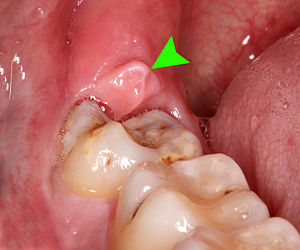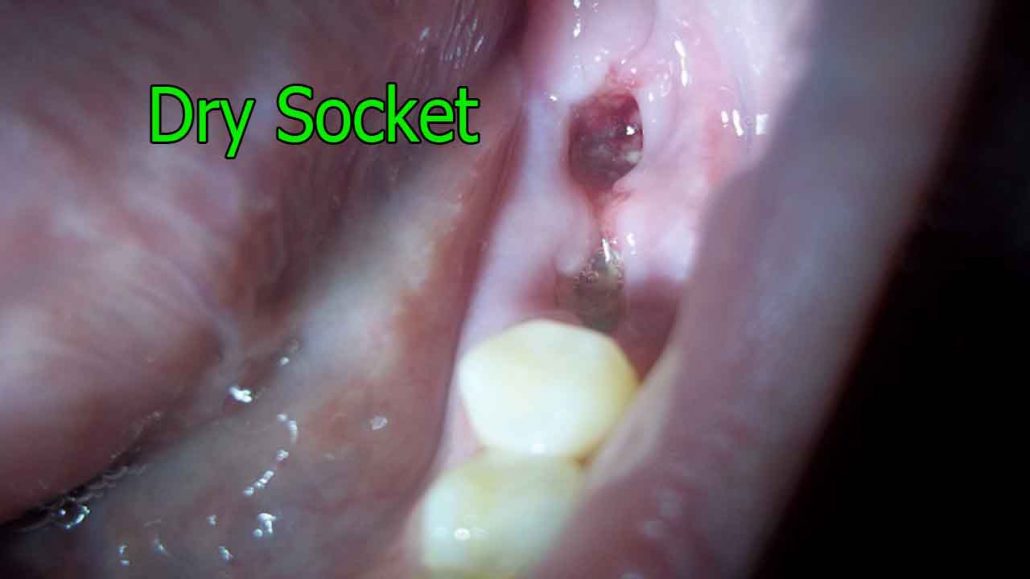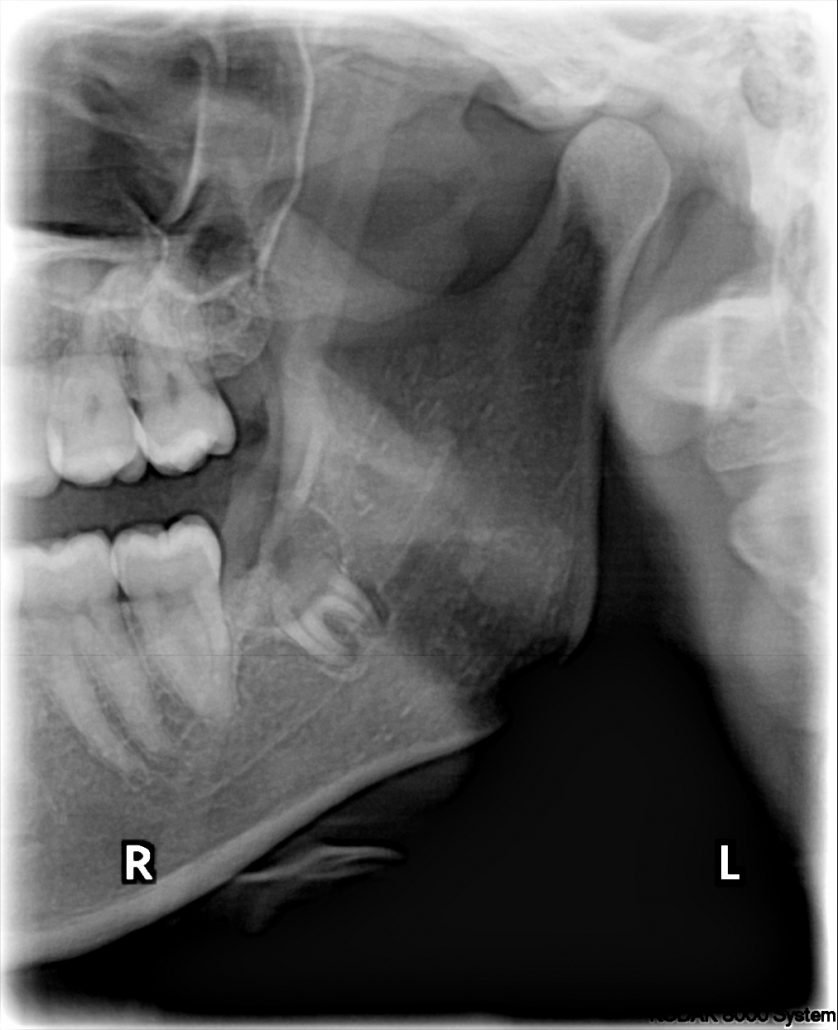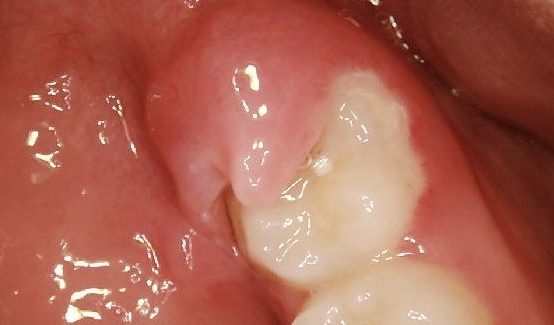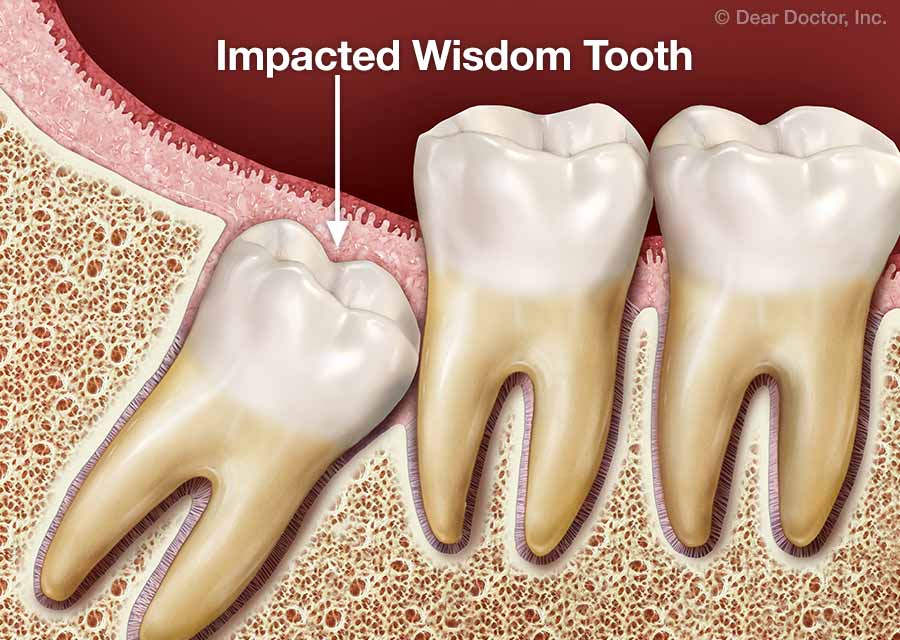What are the symptoms of impacted wisdom teeth?
Signs of impacted wisdom teeth include:
- Pain or swelling of your jaw or face.
- Red, swollen or bleeding gums.
- A bad taste in your mouth.
- Bad breath.
- Difficulty opening your mouth all the way.
How are impacted wisdom teeth treated?
If your impacted teeth are causing pain, infection or other dental issues, removal is usually recommended. Many dentists recommend this oral surgery procedure as a preventative measure to reduce the risk of problems in the future.
Are impacted teeth more painful to remove?
While impacted wisdom teeth are generally more difficult to remove, the process is not necessarily more painful. Your dentist or oral surgeon will give you pain relievers to manage any post-operative discomfort.
What are the risks and complications of wisdom teeth removal?
Like any surgical procedure, wisdom teeth removal comes with some potential risks and complications. These include:
This happens when the blood clot from surgery becomes dislodged from your tooth socket prematurely, exposing your bone, which can then become infected.
Sometimes bacteria and food can become trapped in the tooth socket, resulting in an infection. Your dentist or oral surgeon can prescribe antibiotics to treat this.
- Damage to nearby structures.
Sometimes your nerves, jawbone or sinuses can become damaged during wisdom teeth removal. In addition, adjacent teeth can be affected. Advanced surgical techniques reduce the risk of these injuries, but they can still happen. Additional oral surgery procedures may be necessary to address this type of damage.
If we remove any tooth in the lower jaw, this puts strain on the joints just in front of the ear. Although we try to reduce the strain when we remove teeth, some people get pain and stiffness in the jaw. This usually improves within a few weeks, but for some jaw joint problems can last longer.
Upper wisdom teeth can be close to the sinus. This is a cavity (hole) in the top jaw. When we remove upper teeth, there is a very small risk that the air sinus can get punctured. If this happens, you might need more surgery to repair it.
Is it necessary to remove impacted wisdom teeth?
If your wisdom teeth are impacted but are not causing any problems, you probably do not need to remove them. Impacted wisdom teeth are more prone to infection and abscesses and they can cause damage, decay and disease to healthy teeth. However, if you start developing symptoms, removing them can reduce your risk of other issues and improve your overall oral health.
When should I seek care for impacted wisdom teeth?
If you have pain or other symptoms affecting the area behind your last molar, schedule an appointment with your dentist. They can determine if your issues are due to impacted wisdom teeth.
Impacted wisdom teeth can cause a wide range of symptoms, including swelling, bad taste and pain that radiates throughout your jaw and face. Wisdom teeth removal is a common surgery procedure that can ease your symptoms and reduce the risk of future oral health problems. Talk with your dentist about whether this treatment is right for you.
How long does it take to recover from wisdom teeth removal?
Most people fully recover from wisdom teeth removal in one to two weeks. In most cases, you can return to work, school and other normal routines in just a few days.
When To See a Dentist
If you are experiencing severe pain or discomfort from your wisdom teeth, you should make an appointment with your dentist as soon as possible. Check out our article on what to do when you have a dental emergency.
Your dentist will be able to check your teeth and advise you on further treatment and whether they will need to be removed or not.
Problems Caused by Impacted Wisdom Teeth
As mentioned not all wisdom teeth will cause pain or problems. However, some impacted wisdom teeth that have not fully broken through the surface of the gum can cause problems. This is normally due to food and bacteria getting trapped around the edges and crevices caused by the breaking of the gum, which in turn causes infection and decay.
This happens when the plaque releases toxins that irritate your gums making them red, swollen and cause bleeding.
Due to the plaque developing from the trapped food and bacteria, wisdom tooth problems can cause decay. This is due to the plaque breaking down the enamel on the surface of the tooth, causing cavities.
This is when the soft tissue around the tooth becomes infected from the plaque and can dangerously spread to the throat or the neck.
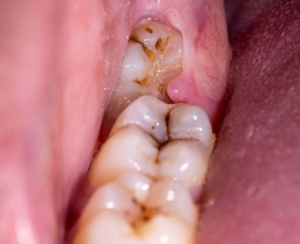
This is a bacterial infection in the cheek, tongue or throat.
These can occur when pus collects in your wisdom teeth, or the surrounding tissue. They are caused by bacterial infection.
Less commonly, cysts can develop from a wisdom tooth not pushing through the gum properly.
Pain Relief from Wisdom Teeth Problems
The best way and, more often than not, the only way to treat a toothache is to go and see your dentist. Then you can be certain you are getting the safe and required treatment you need. However, until you get an appointment with your dentist there are a few ways to treat wisdom teeth pain at home.
Salt water has natural disinfectant properties that can help reduce bacteria in the broken gums that can be the source of the pain.
Mix half a teaspoon of salt in 8oz of cooled boiled water. Swirl it around your mouth for a couple of minutes before spitting down the sink. You can do this a few times a day as necessary.
Over the counter pain relief like Ibuprofen can definitely help reduce inflammation of the gums and that throbbing pain that comes with it. Make sure to follow the package directions and recommended dose to keep safe and help relieve discomfort.
A dental gel that contains the active ingredient, benzocaine, can help reduce the feeling in the gums, therefore numbing the pain. You can get these gels over the counter and apply them directly to the affected gums throughout the day. Again, keep safe by following the packet’s instructions.
Sometimes household items such as an ice pack, chewing on an onion, clove or peppermint, and soaked tea bags can all be used to relieve wisdom tooth pain.
While these remedies can reduce pain caused by wisdom teeth, they are only short-term solutions. When wisdom teeth become impacted, a dentist will normally advise that they be removed to provide long-term relief.
Removal of Wisdom Teeth
Dental surgeons extract wisdom teeth as either a preventive measure or to correct issues caused by how the teeth have erupted.
Wisdom teeth that have emerged completely can be extracted relatively easily by simply pulling them out with forceps. Misaligned or impacted wisdom teeth may entail removal of each tooth bit by bit, making an incision in the gum, and drilling out bone.
If your dentist thinks you may need your wisdom teeth removed, they will usually carry out an X-ray of your mouth. This gives them a clearer view of the position of your teeth and the relative ease at which they can be removed.
Depending on the level of difficulty of the procedure, wisdom teeth removal will involve local or a general aesthetic. Before the procedure, you will usually be given anaesthesia to numb the area around the tooth. You will feel some pressure just before the tooth is removed, but apart from that the procedure should be entirely painless thanks to modern medicine and a calm hand of an experienced dentist. In some cases, an incision may be needed in your gum, and the tooth may need to be cut into smaller pieces before it is removed. The time it takes to remove the tooth will vary. Some procedures only take a few minutes, whereas others can take an hour or longer.
Recovery time after a wisdom tooth extraction varies from person to person. It also depends on the complexity of the procedure, the type of anaesthesia and how much harm the problem has caused to the rest of your mouth.
After your wisdom teeth have been removed, you may experience some swelling and discomfort. This can be on both the inside and outside of your mouth lasting for between 1 or 2 weeks.
If you’re considering wisdom teeth extraction, look for a dental practice that specializes in the procedure. If you wait longer than early adulthood to have wisdom teeth extracted, the complications and risks associated with the procedure – including nerve damage – are likely to increase. Recovery will also take longer.
Activities to avoid after a Wisdom tooth extraction
- It is best to avoid any heavy exercise for a few days.
- You should not drive any vehicle or operate machinery for 48 hours if you had a general anaesthetic.
- There are no restrictions on driving after a local anaesthetic injection into your mouth.
Follow-up appointments
Most people do not need a follow-up appointment after having a wisdom tooth removed. Your surgeon will decide. On the day of your surgery, we arrange any follow-up appointment that you might need.
Prevention
You cannot stop your wisdom teeth coming through, but there are things you can do to make sure the gums are less likely to become infected.
- Practicing good oral hygiene: Brushing teeth twice a day, flossing, and using mouthwash can help reduce the bacteria in the mouth that cause infections.
- Drinking plenty of water: This helps to flush food and bacteria away from the teeth and gums.
- Avoid sugary foods: sweet foods can get stuck inside the broken gums, encouraging bacteria to grow.
Up to 1 in 10 people that we see with wisdom tooth problems have gum disease. You might not have symptoms, but this can still cause problems.
Protecting other teeth.
When wisdom teeth emerge crooked, they can cause other teeth to shift and damage them.
Sinus issues.
The roots of upper wisdom teeth can put pressure on the sinuses – the system of connected cavities in the skull. This can result in sinusitis, congestion, and headaches.
Avoiding complications.
Wisdom teeth extraction becomes more complex once the roots are fully established. People still in their teens have less developed tooth roots, so removal of wisdom teeth then will result in fewer complications. Recovery time is also faster in younger patients.
You do not need them!
Our modern diet of softer foods than our ancestors had to chomp on – such as plant roots and uncooked food – has made wisdom teeth redundant. Scientists class them as vestigial organs that serve no purpose.
Convenience.
Individuals who decide to keep their wisdom teeth will need constant monitoring by their dentist.

